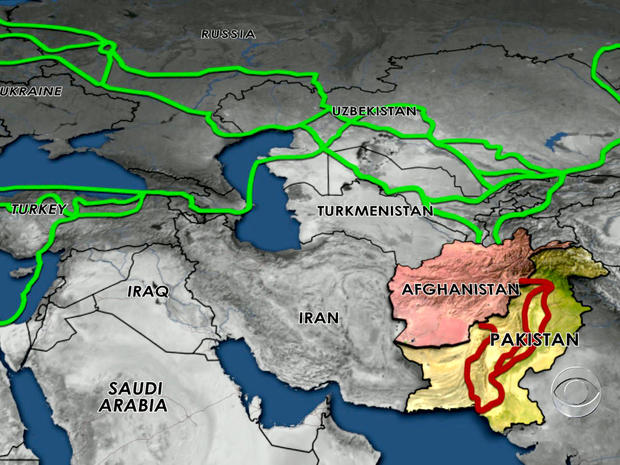U.S. finds way around Pakistan route blockage
(CBS News) Negotiators for the U.S. and Pakistan had hoped to work out a deal to re-open the supply lines for the war in Afghanistan, but the talks broke down Monday.
Getting supplies to U.S. troops has become a big challenge.
Air Force flight managers have been racing against the tyranny of time and distance since November.
When Pakistan suddenly shut down the most important supply routes for U.S. troops in Afghanistan, triggered by the accidental killing of 24 Pakistani troops by American gunships, the shutdown left Maj. Gen. Mike Lally, director of operations for the U.S. Transportation Command, facing a potential disaster.
"Almost 7,000 pieces, truckloads of equipment, was stranded either in the ports of Karachi, or on the road between the port and the border crossings," Lally said.
A satellite photo shows docks crammed with containers not going anywhere. More were on the way.
"There was about 40 (to) 50 ships that we had to divert that were en route to Pakistan," Lally said.
U.S. pulls team from Afghan supply route talks
Afghanistan tunnel carries risks for NATO
The cut-off also cost troops in Afghanistan a major source of fuel.
"About 50 percent of the fuel we purchase we were purchasing from Pakistan refineries, moving it to Pakistani trucks into Afghanistan," Lally said.
Like all the other trucks, those tankers were no longer moving, making cutting off the supply lines by Pakistan a kind of double-whammy.
Traffic managers had to start sending everything through what's called the "northern distribution network." Ships carry supplies to ports and from there they are hauled by truck and train to Afghanistan.
One critical item -- ammunition -- is flown straight in. For Col. Rob Brisson, who runs the command center, gasoline was the most critical commodity.
Although supplies got low, "we never got below 30 days of supply," Brisson said.
The U.S. started buying fuel from countries to the north of Afghanistan, sometimes air dropping it in bladders directly to remote combat outposts. All told the troops need 1.6 million gallons of jet fuel, 400 tons of food, 60,000 gallons of water and 160 tons of other cargo each day.
"We can keep it up as long as we have to keep it up," Brisson said.
In fact, the U.S. has more supplies on hand today than it did when Pakistan shut down its border.

